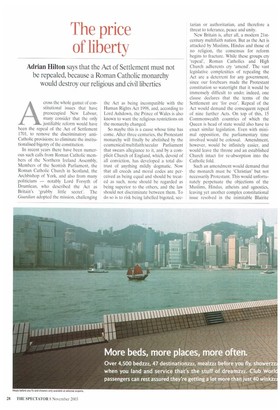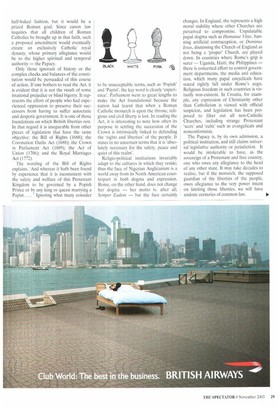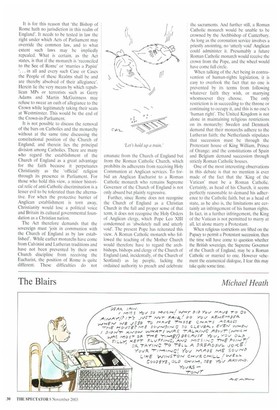The price of liberty
Adrian Hilton says that the Act of Settlement must not be repealed, because a Roman Catholic monarchy would destroy our religious and civil liberties Across the whole gamut of constitutional issues that have preoccupied New Labour, many consider that the only justifiable reform would have been the repeal of the Act of Settlement 1701, to remove the discriminatory antiCatholic provisions: to eliminate the institutionalised bigotry of the constitution.
In recent years there have been numerous such calls from Roman Catholic members of the Northern Ireland Assembly, Members of the Scottish Parliament, the Roman Catholic Church in Scotland. the Archbishop of York, and also from many politicians — notably Lord Forsyth of Drumlean, who described the Act as Britain's `grubby little secret". The Guardian adopted the mission, challenging the Act as being incompatible with the Human Rights Act 1998, and, according to Lord Ashdown, the Prince of Wales is also known to want the religious restrictions on the monarchy changed.
So maybe this is a cause whose time has come. After three centuries, the Protestant monarchy will finally be abolished by the ecumenical/multifaith/secular Parliament that swears allegiance to it, and by a complicit Church of England, which, devoid of all conviction, has developed a total distrust of anything mildly dogmatic. Now that all creeds and moral codes are perceived as being equal and should be treated as such, none should be regarded as being superior to the others, and the law should not discriminate between them. To do so is to risk being labelled bigoted, sec
tarian or authoritarian, and therefore a threat to tolerance, peace and unity.
New Britain is, after all, a modern 21stcentury multifaith nation. But as the Act is attacked by Muslims, Hindus and those of no religion, the consensus for reform begins to fracture. While these groups cry 'repeal', Roman Catholics and High Church adherents cry 'amend'. The vast legislative complexities of repealing the Act are a deterrent for any government, since our forebears made the Protestant constitution so watertight that it would be immensely difficult to undo; indeed, one clause declares that the terms of the Settlement are 'for ever'. Repeal of the Act would demand the consequent repeal of nine further Acts. On top of this, 15 Commonwealth countries of which the Queen is head of state would also have to enact similar legislation. Even with minimal opposition, the parliamentary time involved would be colossal. Amendment, however, would be infinitely easier, and would leave the throne and an established Church intact for re-absorption into the Catholic fold.
Such an amendment would demand that the monarch must be 'Christian' but not necessarily Protestant. This would unfortunately perpetuate the objections of the Muslims, Hindus, atheists and agnostics, leaving yet another complex constitutional issue resolved in the inimitable Blairite half-baked fashion, but it would be a prized Roman goal. Since canon law requires that all children of Roman Catholics be brought up in that faith, such a proposed amendment would eventually create an exclusively Catholic royal dynasty, whose primary allegiance would be to the higher spiritual and temporal authority — the Papacy.
Only those ignorant of history or the complex checks and balances of the constitution would be persuaded of this course of action. If one bothers to read the Act, it is evident that it is not the result of some irrational prejudice or blind bigotry. It represents the effort of people who had experienced oppression to preserve their successors from having to suffer autocratic and despotic government. It is one of those foundations on which British liberties rest. In that regard it is inseparable from other pieces of legislation that have the same objective: the Bill of Rights (1688); the Coronation Oaths Act (1688); the Crown in Parliament Act (1689); the Act of Union (1706); and the Royal Marriages Act (1772).
The wording of the Bill of Rights explains, And whereas it hath been found by experience that it is inconsistent with the safety and welfare of this Protestant Kingdom to be governed by a Popish Prince or by any king or queen marrying a Papist. . . . ' Ignoring what many consider to be unacceptable terms, such as 'Popish' and 'Papist', the key word is clearly 'experience'. Parliament went to great lengths to make the Act foundational because the nation had learnt that when a Roman Catholic monarch is upon the throne, religious and civil liberty is lost. In reading the Act, it is interesting to note how often its purpose in settling the succession of the Crown is intrinsically linked to defending the 'rights and liberties' of the people. It states in no uncertain terms that it is 'absolutely necessary for the safety, peace and quiet of this realm'.
Religio-political institutions invariably adapt to the cultures in which they reside; thus the face of Nigerian Anglicanism is a world away from its North American counterpart in both dogma and expression. Rome, on the other hand, does not change her dogma — her motto is, after all, Semper Eadem — but the face certainly changes. In England, she represents a high moral stability where other Churches are perceived to compromise. Unpalatable papal dogma such as Humanae Vitae, banning artificial contraception. or Dominus Jesus, dismissing the Church of England as not being a 'proper' Church, are played down. In countries where Rome's grip is surer — Uganda, Haiti, the Philippines — there is concerted effort to control government departments, the media and education, which many papal encyclicals have stated rightly fall under Rome's aegis. Religious freedom in such countries is virtually non-existent. In Croatia, for example, any expression of Christianity other than Catholicism is viewed with official suspicion, and legislation has been proposed to filter out all non-Catholic Churches, including strange Protestant 'sects' and 'cults' such as evangelicals and nonconformists.
The Papacy is, by its own admission, a political institution, and still claims universal legislative authority or jurisdiction. It would be intolerable to have, as the sovereign of a Protestant and free country, one who owes any allegiance to the head of any other state. It may take decades to realise, but if the monarch, the supposed guardian of the liberties of the people, owes allegiance to the very power intent on limiting those liberties, we will have undone centuries of common law. It is for this reason that 'the Bishop of Rome hath no jurisdiction in this realm of England'. It needs to be tested in law the right under which Acts of Parliament may override the common law, and to what extent such laws may be impliedly repealed. What is certain, as the Act states, is that if the monarch is `reconciled to the See of Rome' or 'marries a Papist' . . in all and every such Case or Cases the People of these Realms shall be and are thereby absolved of their allegiance'. Herein lie the very means by which republican MPs or terrorists such as Gerry Adams and Martin McGuinness may refuse to swear an oath of allegiance to the Crown while legitimately taking their seats at Westminster. This would be the end of the Crown-in-Parliament.
It is not possible to discuss the removal of the bars on Catholics and the monarchy without at the same time discussing the constitutional position of the Church of England; and therein lies the principal division among Catholics. There are many who regard the establishment of the Church of England as a great advantage for the faith because it perpetuates Christianity as the 'official' religion through its presence in Parliament. For those who hold this view, a minor historical relic of anti-Catholic discrimination is a lesser evil to be tolerated than the alternative. For when the protective barrier of Anglican establishment is torn away, Christianity would lose a political voice and Britain its cultural governmental foundation as a Christian nation.
The Act therefore demands that the sovereign must 'join in communion with the Church of England as by law established'. While earlier monarchs have come from Calvinist and Lutheran traditions and have not been prevented by their own Church discipline from receiving the Eucharist, the position of Rome is quite different. These difficulties do not emanate from the Church of England but from the Roman Catholic Church, which prohibits its adherents from receiving Holy Communion at Anglican services. To forbid an Anglican Eucharist to a Roman Catholic monarch who remains Supreme Governor of the Church of England is not only absurd but plainly regressive.
Further, since Rome does not recognise the Church of England as a Christian Church in the full and proper sense of that term, it does not recognise the Holy Orders of Anglican clergy. which Pope Leo XIII condemned as 'absolutely null and utterly void'. The present Pope has reiterated this view. A Roman Catholic monarch who followed the teaching of the Mother Church would therefore have to regard the archbishops, bishops and clergy of the Church of England (and, incidentally, of the Church of Scotland) as lay people, lacking the ordained authority to preach and celebrate the sacraments. And further still, a Roman Catholic monarch would be unable to be crowned by the Archbishop of Canterbury. As long as the coronation service involves a priestly anointing, no 'utterly void' Anglican could administer it. Presumably a future Roman Catholic monarch would receive the crown from the Pope, and the wheel would have come full circle.
When talking of the Act being in contravention of human-rights legislation, it is easy to overlook the fact that no one is prevented by its terms from following whatever faith they wish, or marrying whomsoever they choose. The only restriction is in succeeding to the throne or continuing to occupy it, and this is no one's 'human right'. The United Kingdom is not alone in maintaining religious restrictions on its monarchy: Sweden and Denmark demand that their monarchs adhere to the Lutheran faith; the Netherlands stipulates that succession must be through the Protestant house of King William. Prince of Orange; and the constitutions of Spain and Belgium demand succession through strictly Roman Catholic houses.
One of the most interesting observations in this debate is that no mention is ever made of the fact that the 'King of the Vatican' must be a Roman Catholic. Certainly, as head of his Church, it seems perfectly reasonable to demand his adherence to the Catholic faith, but as a head of state, as he also is, the limitations are certainly an infringement of his human rights. In fact, in a further infringement, the King of the Vatican is not permitted to marry at all, let alone marry a Protestant.
When religious restrictions are lifted on the Papacy to permit a Protestant succession, then the time will have come to question whether the British sovereign, the Supreme Governor of the Church of England. may be a Roman Catholic or married to one. However vehement the ecumenical dialogue, I fear this may take quite some time.




































































































 Previous page
Previous page